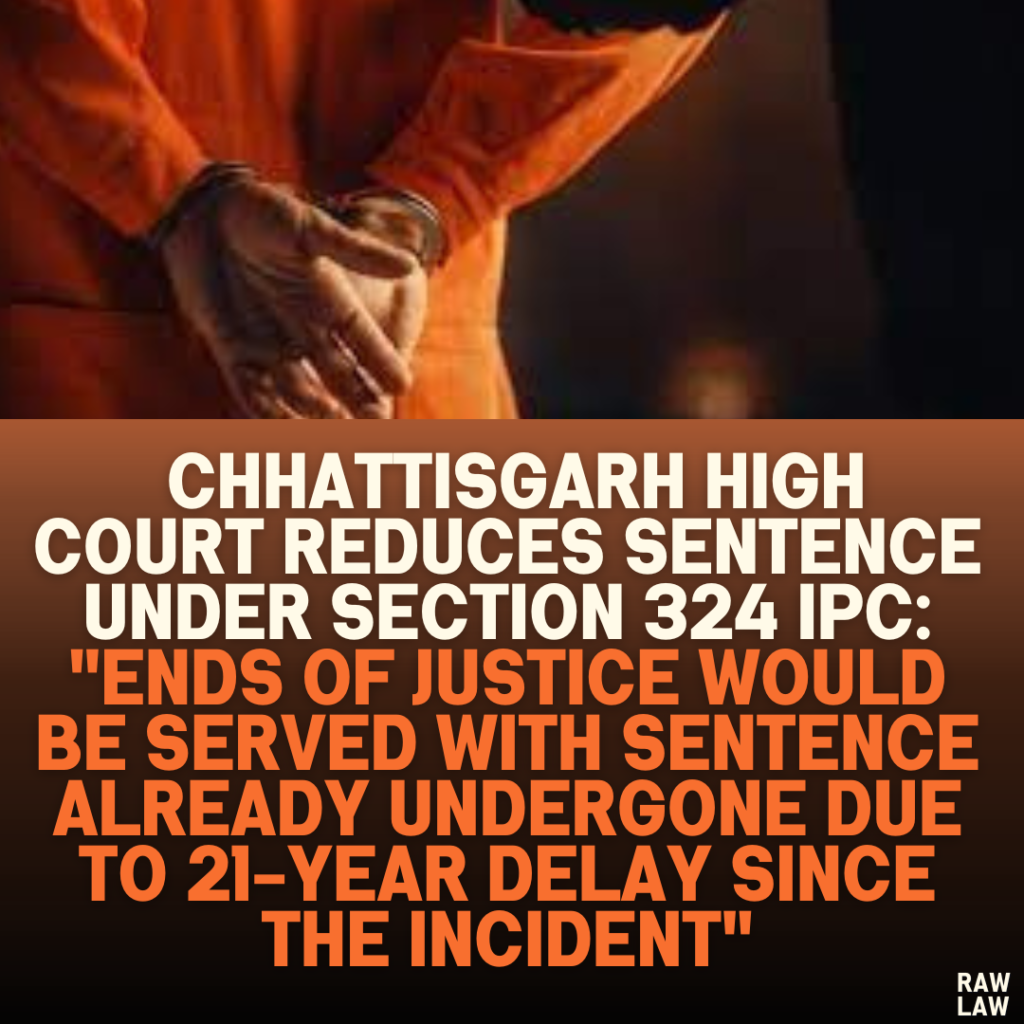Court’s Decision
The Chhattisgarh High Court modified the appellant’s sentence for an offence under Section 324 of the IPC. The trial court had sentenced the appellant to rigorous imprisonment for six months with a fine of ₹1,000, and an additional four months of imprisonment in case of non-payment of the fine. The High Court reduced this sentence to the period already undergone by the appellant, which was 18 days. The court justified its decision by citing the significant time lapse of 21 years since the offence and determined that no purpose would be served by further imprisonment.
Facts
- Incident Details: On October 26, 2003, the appellant went to the complainant’s house for a meal, accompanied by others. A quarrel broke out between the appellant and another individual named Gopal.
- Sequence of Events:
- The complainant intervened and sent the appellant and others back to their respective homes.
- Later, the appellant reportedly assaulted the complainant’s servant, Kaila Ram, and the complainant found him injured on the road.
- When the complainant attempted to help Kaila Ram, the appellant attacked him with an axe, causing an injury to his left shoulder.
- Legal Proceedings: The complainant filed a report (Exhibit P-1), and the police investigation led to the filing of a charge sheet against the appellant.
Issues
- Whether the conviction under Section 324 IPC was valid and supported by evidence.
- Whether the sentence imposed by the trial court was appropriate, considering the circumstances, including the time lapse since the offence.
Petitioner’s Arguments
The appellant’s counsel focused on reducing the sentence, presenting the following arguments:
- The appellant accepted the conviction and did not contest it.
- Since the incident occurred 21 years ago, the appellant, now aged 43, had already served 18 days in jail.
- Sending the appellant back to jail after such a long period would serve no constructive purpose.
- A reduction in the sentence was sought to ensure justice and proportionality.
Respondent’s Arguments
The State, represented by its counsel, supported the trial court’s judgment and opposed the plea for reducing the sentence. It contended that the trial court’s sentence was just and appropriate in light of the offence committed.
Analysis of the Law
- Section 324 IPC: The offence involves voluntarily causing hurt by dangerous weapons or means, which carries a punishment of imprisonment up to three years, or with fine, or both.
- Sentencing Principles: The court acknowledged that sentencing must balance the seriousness of the offence, the time elapsed since its commission, and the reformative potential of the accused.
- Time Lapse: The court gave significant weight to the 21-year delay since the offence and the fact that the appellant had already undergone a part of the sentence.
Precedent Analysis
Although the judgment did not explicitly cite specific case laws, the court’s reasoning aligned with established legal principles emphasizing proportionality in sentencing, particularly in cases involving delayed trials or appeals.
Court’s Reasoning
- Conviction Validity: Based on witness testimonies, including those of Ramsurat Yadav (PW-1) and Kaila Ram (PW-2), as well as medical evidence provided by Dr. Rajendra Banshraya (PW-4), the court affirmed the trial court’s findings of guilt.
- Reduction of Sentence: The court considered:
- The passage of 21 years since the incident.
- The fact that the appellant had already served 18 days in jail.
- The absence of any further allegations of misconduct by the appellant since the offence.
- Proportionality and Justice: The court concluded, “The ends of justice would be served with the sentence already undergone by the appellant,” as further imprisonment was deemed unnecessary and disproportionate.
Conclusion
The court allowed the appeal in part by modifying the sentence as follows:
- The appellant was sentenced to the period already undergone (18 days) instead of six months of rigorous imprisonment.
- The fine of ₹1,000 imposed by the trial court remained intact.
- The appellant’s bail bonds were extended for six months under Section 437-A of the Cr.P.C.
Implications
This judgment underscores the importance of proportionality in sentencing. The court balanced the seriousness of the offence with the time elapsed and the reformative potential of the appellant. It also reflects the judiciary’s inclination to provide leniency in cases where further imprisonment serves no constructive purpose, especially after a significant delay in legal proceedings.
